Serbia and Kosovo have reached an agreement during European Union-mediated talks in Brussels to end a tense standoff at their mutual border that was triggered 10 days ago by a dispute over vehicle registration plates.
Two border crossings between Serbia and Kosovo have been blocked by local Serbs since Kosovar authorities on September 20 required all drivers from Serbia entering Kosovo to use temporary printed license plates that are valid for 60 days.
The Kosovar government said the move was in retaliation for measures in force in Serbia against drivers from Kosovo since 2008, when the country declared independence from Belgrade.
Serbia does not recognize its former province’s independence and therefore its right to take official actions such as registering cars.
Kosovo’s government has deployed special police forces to the Jarinje and Brnjak border crossings to impose the new rule, while Serbian military jets and helicopters have been flying close to the border in an apparent show of force.
European Union envoy Miroslav Lajcak posted on Twitter a picture of the agreement reached between the two sides on September 30 following what he called two days of “intense negotiations” in the Belgian capital.
Serbian President Aleksandar Vucic said he was “personally very satisfied,” while Kosovar Prime Minister Albin Kurti said: “Now begins the era when Serbia is starting to get used to reciprocity.”
EU and U.S. officials also welcomed the compromise, and called for dialogue between Pristina and Belgrade to continue to normalize their relations.
According to the agreement posted by Lajcak on Twitter, three main points have been agreed by the two sides:
— Special police units located at the joint border crossings in Jarinje and Brnjak will remove barricades and leave on October 2, while members of the NATO-led KFOR stabilization force will deploy at the two crossings before the start of the withdrawal of the police and the removal of barricades, remaining there for two weeks to ensure security;
— From October 4, a sticker will replace the removal of the license plates of cars registered in Kosovo and Serbia as a temporary measure until a permanent solution is identified;
— On October 21, Kosovar and Serbian officials will form a working group chaired by the EU and start working toward a permanent solution that will be presented within six months to the high-level format of the Serbia-Kosovo Dialogue.
In his tweet, Lajcak thanked the Kosovar and Serbian chief negotiators, Besnik Bislimi and Petar Petkovic, for “their readiness to negotiate and agree for the good of the people.”
The EU diplomatic service welcomed the outcome of the negotiations in Brussels, and urged both parties to “constructively engage in the Dialogue in order to make swift progress on comprehensive normalisation of their relations.”
European Commission chief Ursula von der Leyen — who was visiting Serbia when the deal was struck — described the agreement as a “very positive development.”
“It is good for the whole region. Now the dialogue must continue,” she wrote in a tweet.
U.S. Deputy Secretary of State Gabriel Escobar, who oversees the Western Balkans, also applauded the agreement but underlined that there is “still an awful lot on the agenda” between two sides that needs to be addressed.
“I think we can make enormous strides in helping the Balkans get over a very difficult period during the ‘90s and hopefully, eventually become more integrated with the European Union,” he said on a briefing call with reporters.






